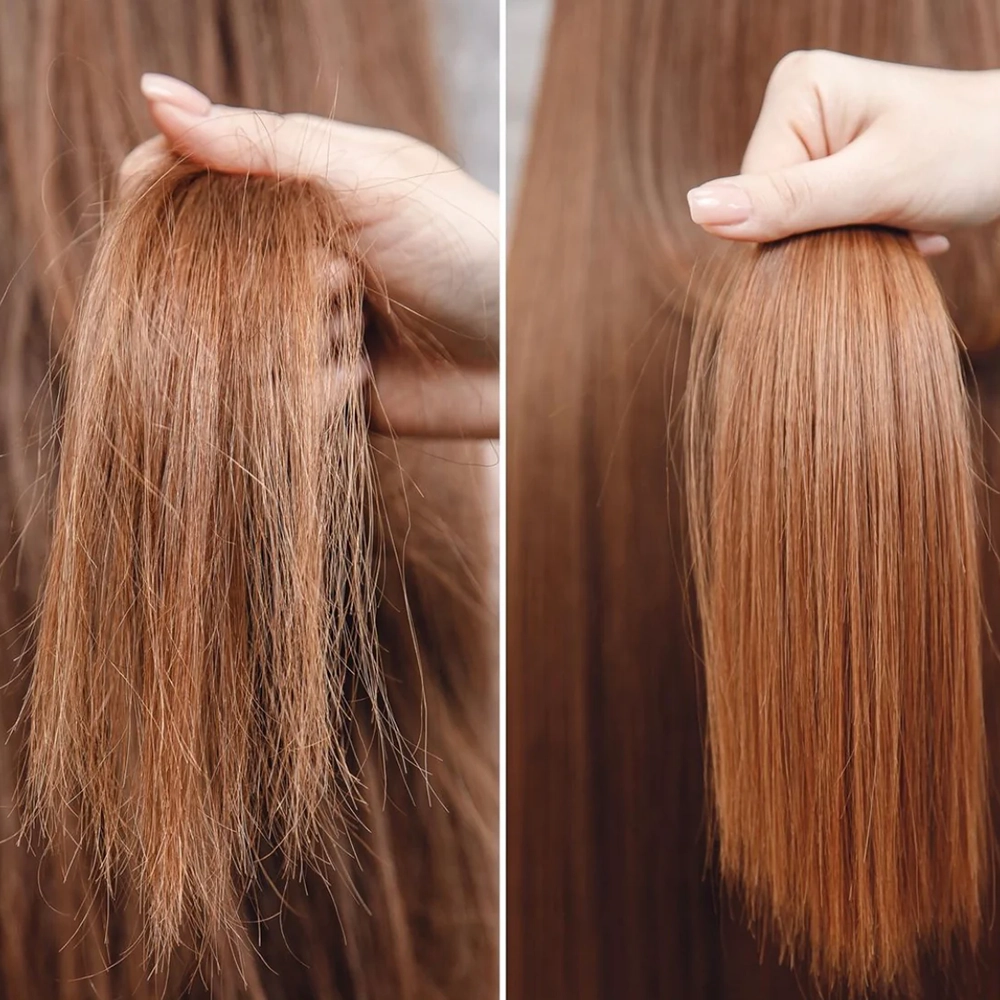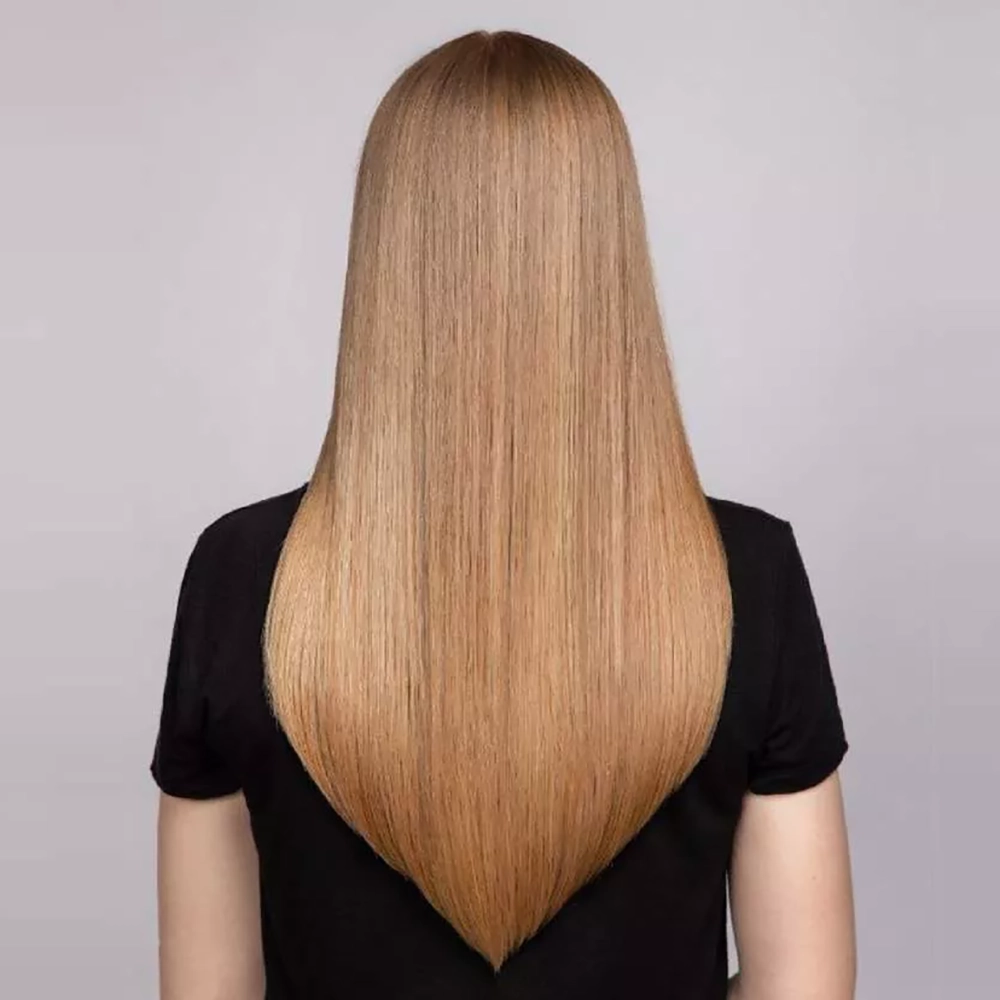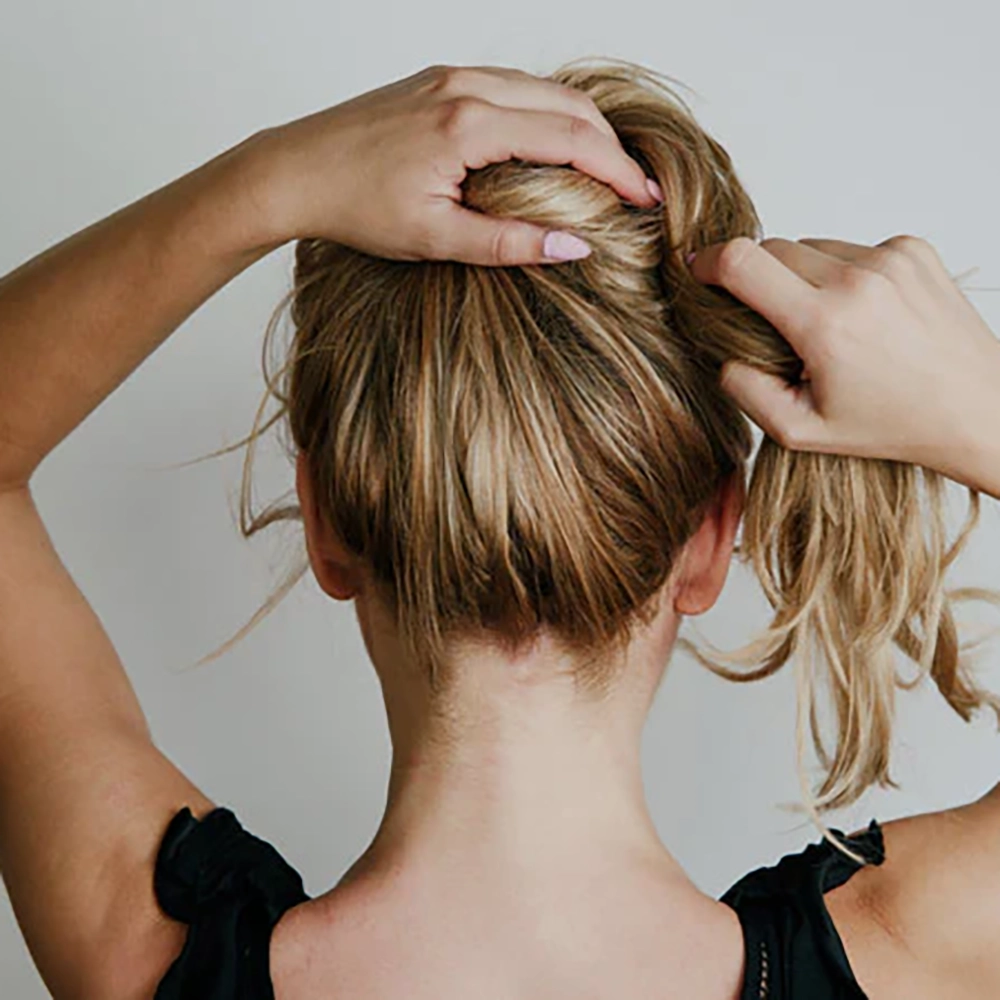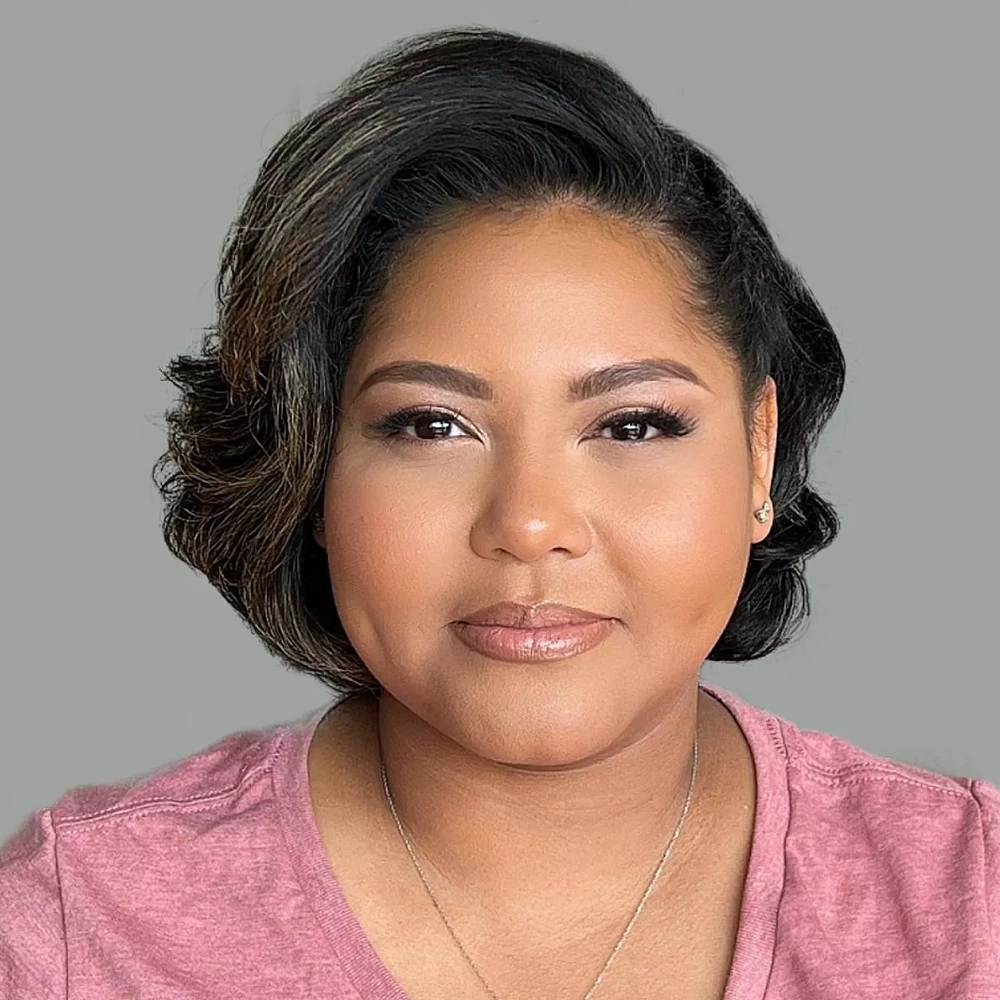Understanding the role of protein in hair health
Protein plays a crucial role in maintaining the health of our hair. It is a vital component that helps in the growth, repair, and strength of our hair strands. Without sufficient protein, our hair can become weak, brittle, and prone to breakage. In this blog post, we will delve deeper into the importance of protein in hair health and explore its various functions.
Firstly, protein is the building block of our hair. Each strand of hair is composed of a protein called keratin. Keratin provides structure and strength to our hair, making it less susceptible to damage. It helps in maintaining the elasticity and resiliency of our hair, making it less prone to breakage.
In addition to its structural role, protein also plays a vital role in the growth and repair of our hair. The hair follicles, which are responsible for hair growth, require an adequate supply of protein to produce healthy hair. Protein helps in promoting hair growth and reducing hair loss. It also aids in the repair of damaged hair strands, by repairing and strengthening the weakened areas.
Furthermore, protein also contributes to the overall health and appearance of our hair. It helps in retaining moisture and improving the hydration levels of our hair. This is particularly important for individuals with dry and brittle hair. Protein treatments can help in restoring moisture balance and enhancing the shine and smoothness of our hair.
Listed below are some signs that indicate your hair may need protein:
| Signs of Protein Deficiency |
|---|
| 1. Excessive hair breakage |
| 2. Weak and brittle hair |
| 3. Lack of hair elasticity |
| 4. Slow hair growth |
| 5. Dull and lifeless hair |
If you notice any of these signs, it may be an indication that your hair lacks protein. Incorporating protein treatments into your haircare routine can help in addressing these issues and improving the overall health of your hair.
In conclusion, protein plays a significant role in maintaining the health and vitality of our hair. It helps in strengthening the hair strands, promoting growth, and repairing damage. If you are experiencing any signs of protein deficiency, it is important to incorporate protein treatments into your haircare routine. Consulting a professional hair stylist can also help in determining your personalized hair protein needs. Remember, a balanced protein-moisture ratio is essential for healthy and beautiful hair.
Signs that indicate your hair needs protein
Your hair is an important aspect of your overall appearance, and keeping it healthy and strong is key. One crucial component for hair health is protein. Protein plays a vital role in the structure of your hair, helping to strengthen and repair damaged strands. However, just like any other part of your body, your hair can sometimes experience protein deficiency. This can lead to a variety of issues, which can be easily identified through certain signs. In this blog post, we will discuss some common signs that indicate your hair needs protein and what you can do about it.
Listed below are some of the signs that may suggest your hair is in need of protein:
| Signs | Description |
|---|---|
| Dry and brittle hair | If your hair feels excessively dry and tends to break easily, it could be a sign of protein deficiency. Protein helps maintain the moisture balance in your hair, and without enough protein, your hair can become dry and brittle. |
| Increase in hair shedding | Experiencing an unusual increase in hair shedding or noticing more hair than usual on your hairbrush or in the shower drain is another sign that your hair may be lacking protein. Protein is essential for hair growth and strength, so deficiency can result in increased hair loss. |
| Lack of elasticity | Your hair should have a certain level of elasticity, which allows it to stretch and bounce back without breaking. Protein is responsible for providing this elasticity, so if your hair feels weak and lacks flexibility, it may be a sign that protein is needed. |
The importance of a balanced protein-moisture ratio
When it comes to hair health, there is a delicate balance between protein and moisture that must be maintained. Achieving this balance is crucial for maintaining strong, healthy hair. Too much protein can lead to dry, brittle strands, while too much moisture can leave hair weak and prone to breakage. Let’s delve into the significance of a balanced protein-moisture ratio and how it can benefit your hair.
A balanced protein-moisture ratio is essential for optimal hair health. Protein is the building block of our hair, providing strength and structure. It helps repair damaged hair and prevents breakage. On the other hand, moisture is vital for maintaining hair’s elasticity and preventing dryness. It keeps our strands hydrated, nourished, and supple.
So, why is it important to strike a balance between these two components? When hair lacks protein, it becomes weak and prone to breakage. It may also appear limp and lifeless. On the contrary, excessive protein can make hair stiff and brittle, leading to breakage. Similarly, too much moisture can make the hair overly flexible and weak, increasing the risk of breakage as well.
Different sources of protein for hair care
Protein is an essential nutrient that plays a vital role in promoting healthy and strong hair. It helps in building and repairing the hair strands, preventing breakage, and promoting hair growth. However, our bodies are not capable of producing all the necessary proteins on their own. Hence, it is important to incorporate protein-rich foods into our diet or use protein-based products for hair care. In this blog post, we will explore different sources of protein that are beneficial for hair care.
One of the most common sources of protein for hair care is eggs. They are packed with essential nutrients like vitamins A, D, and E, as well as biotin and folic acid. These nutrients promote hair growth, prevent hair loss, and improve the overall health of the hair. Including eggs in your diet or using egg-based hair masks can help strengthen your hair and add shine.
Quinoa is another excellent source of protein for hair care. It contains all nine essential amino acids, which are the building blocks of protein. The high amino acid content in quinoa helps in strengthening the hair, preventing breakage, and promoting healthy hair growth. Adding quinoa to your meals or using quinoa-based hair products can boost the protein content in your hair.
Greek yogurt is also a great source of protein for hair care. It is rich in casein, a type of protein that promotes hair strength and thickness. The probiotics present in Greek yogurt also promote a healthy scalp, which is essential for maintaining healthy hair. Consuming Greek yogurt or using it as a hair mask can nourish the hair and promote overall hair health.
These are just a few examples of different sources of protein that are beneficial for hair care. Incorporating protein-rich foods like eggs, quinoa, and Greek yogurt into your diet or using protein-based hair products can help improve the health and appearance of your hair. Remember that maintaining a balanced protein-moisture ratio is crucial for preventing protein overload or moisture imbalance. Consult a professional to determine your personalized hair protein needs and create a suitable hair care routine.
How to incorporate protein treatments into your hair routine
When it comes to taking care of your hair, protein treatments can play a crucial role in maintaining its health and strength. Proteins are essential nutrients that help repair damaged hair, promote growth, and prevent breakage. By incorporating protein treatments into your hair routine, you can ensure that your locks are getting the nourishment they need to thrive.
There are several ways you can incorporate protein treatments into your hair routine. One popular method is using protein-rich hair masks or conditioners. These products are specifically formulated to deliver high levels of protein directly to your hair strands. Look for ingredients such as keratin, collagen, or hydrolyzed wheat protein, as these are known for their hair-strengthening properties. Apply the treatment to clean, damp hair, focusing on the mid-lengths and ends. Leave it on for the recommended time, usually around 10-20 minutes, before rinsing thoroughly.
Another way to incorporate protein treatments into your hair routine is by using protein-infused styling products. This can include leave-in conditioners, serums, or creams that contain protein as one of their main ingredients. These products not only provide nourishment and strength to your hair but also help protect it from heat styling and environmental damage. Apply a small amount of the product to your hands, rub them together, and distribute it evenly through damp or dry hair. Style as usual.
List of different sources of protein for hair care:
- Eggs
- Yogurt
- Quinoa
- Lean meats
- Soybeans
- Almonds
- Chickpeas
It’s important to note that while protein treatments can be beneficial for your hair, excessive usage can lead to protein overload. This can make your hair feel brittle, dry, and prone to breakage. It’s essential to maintain a balance between protein and moisture in your hair. If you notice any signs of protein overload, such as stiffness or lack of flexibility in your hair, it may be time to reassess your protein treatment frequency.
Consulting a professional hair stylist or trichologist can help you determine the appropriate protein needs for your hair and create a personalized hair care routine. They can assess your hair’s current condition, identify any protein deficiencies or excesses, and recommend specific products or treatments tailored to your needs.
| Benefits of Incorporating Protein Treatments: | Potential Risks of Excessive Protein Usage: |
|---|---|
| 1. Improved Hair Strength: Protein treatments help strengthen the hair shaft, reducing breakage and promoting overall hair health. | 1. Protein Overload: Excessive protein usage can lead to protein overload, making the hair feel stiff, dry, and prone to breakage. |
| 2. Enhanced Hair Growth: Proteins provide essential building blocks for hair growth, stimulating the follicles and promoting new hair growth. | 2. Lack of Moisture: Protein treatments should be balanced with moisture to avoid drying out the hair, as protein alone cannot provide hydration. |
| 3. Repair Damaged Hair: Protein treatments can help repair and restore damaged hair, improving its overall appearance and texture. | 3. Hair Brittleness: Excessive protein usage can make the hair overly brittle and prone to snapping or splitting. |
Potential risks of excessive protein usage
Protein is an essential nutrient that plays a vital role in maintaining the health and strength of our hair. It is responsible for building and repairing tissues, including those in our hair follicles. However, like anything in life, too much of a good thing can be harmful. In the case of protein usage for hair care, excessive amounts can lead to some potential risks that need to be considered.
One of the main risks of excessive protein usage on hair is protein overload. This occurs when the hair becomes overloaded with protein and starts to become stiff, brittle, and prone to breakage. Too much protein can disturb the delicate balance between moisture and protein in the hair, leading to dryness and lack of flexibility.
Another potential risk is that excessive protein usage can cause an allergic reaction in some individuals. While protein itself is not an allergen, certain proteins used in hair products can cause an allergic response in sensitive individuals. It’s important to be aware of any unusual reactions or sensitivities when using protein-based hair products.
| Signs of excessive protein usage |
|---|
| Dry, brittle hair: If your hair feels dry and brittle despite regular moisturizing, it could be a sign of excessive protein usage. |
| Increased breakage: Protein overload can cause the hair to become more susceptible to breakage, leading to increased hair loss. |
| Stiffness and lack of flexibility: Excessive protein can make the hair feel stiff and rigid, lacking its natural flexibility. |
| Excessive dryness: If your hair feels excessively dry and lacks moisture, it may be due to an imbalance between protein and moisture. |
If you suspect that you may be experiencing the risks of excessive protein usage, it is important to take action to restore the balance in your hair. One way to do this is by incorporating more moisturizing products into your hair care routine. Look for conditioners and treatments that contain hydrating ingredients such as aloe vera, glycerin, or coconut oil.
Additionally, it is recommended to reduce the frequency of protein treatments and use them only when necessary or as advised by a hair care professional. Consulting a professional can help you determine the right balance of protein and moisture for your specific hair needs, avoiding the risks associated with excessive protein usage.
Consulting a professional for personalized hair protein needs
When it comes to maintaining healthy hair, protein plays a crucial role. Protein is known as the building block of hair, as it helps in strengthening and repairing the hair strands. However, not all hair types require the same amount or type of protein. Consulting a professional for personalized hair protein needs is essential to ensure that you are providing your hair with the right amount of protein it needs.
One of the signs that indicate your hair needs protein is excessive hair breakage. If you notice that your hair is breaking easily and lacks strength, it may be a sign that your hair needs more protein. Another indicator is when your hair feels weak and lacks elasticity. Protein treatments can help in restoring the strength and elasticity of your hair, but it is important to consult a professional to determine the amount and frequency of treatments required.
Consulting a professional for personalized hair protein needs is crucial because they can assess your hair type, its condition, and your specific needs. A professional can also help determine the right sources of protein for your hair care routine. There are various sources of protein that can be incorporated into your hair care routine, including animal-based proteins like keratin and collagen, as well as plant-based proteins like soy and quinoa.
| Animal-based Proteins | Plant-based Proteins |
|---|---|
| Keratin: Derived from animals, keratin is a structural protein that helps improve hair strength and reduce frizz. | Soy: Contains amino acids that can enhance hair elasticity and promote hair growth. |
| Collagen: Provides structural support to the hair and can help improve hair thickness and reduce breakage. | Quinoa: Rich in proteins and amino acids, quinoa strengthens the hair and adds shine. |
Excessive protein usage can also have potential risks for your hair. Too much protein can make the hair stiff, dry, and prone to breakage. Consulting a professional can help prevent excessive protein usage and ensure that you strike the right balance between protein and moisture for your hair. It is important to maintain a balanced protein-moisture ratio to keep your hair healthy and resilient.
Incorporating protein treatments into your hair routine can be beneficial, but the specific needs of your hair may vary. A professional can provide personalized recommendations based on the condition of your hair, your styling habits, and any ongoing hair concerns. They can guide you on the frequency of protein treatments and suggest suitable products for your hair.
When it comes to your hair’s protein needs, it is always best to consult a professional. They can help you understand the unique requirements of your hair and provide personalized advice and recommendations. By doing so, you can ensure that you are giving your hair the care it deserves and promoting its overall health and vitality.


























